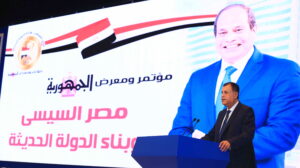
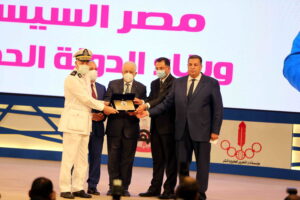
By Amira Sayed, Maryam Raafat
and Wael Salem
The conference, titled, “Egypt-Sisi and Building the New Republic”, was held under the auspices of Board Chairman of Dar Al-Tahrir for Printing and Publishing Eyyad Abu el-Haggag.
A host of cabinet ministers, senior state officials and media attended the conference which was held at Al-Manara International Conferences Centre in New Cairo.
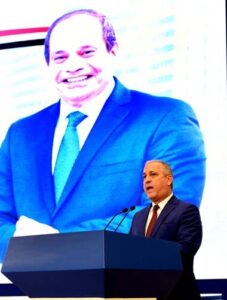
The chairman of the National Press Authority (NPA), Abdel-Sadek el-Shorbagy, was also present in the event. He thanked Al-Gomhouria for the ‘tremendous’ efforts it made in organising the conference.
This conference, he said, is held to commemorate seven years of achievements under the leadership of President Sisi.
“The president shouldered the responsibility [of leading Egypt] after a great popular revolution to preserve the state’s institutions and properties and achieve real development and modern construction at all levels,” el-Shorbagy said.
Conference aimed to document the achievements made in Egypt in all domains in the past seven years.
El-Shorbagy said these achievements are bringing Egypt back to its position of regional and international leadership.
” Egypt has made great strides on the road of comprehensive reform, thanks to an overall and sustainable development plan and a strong political will to build the new republic,” the NPA chairman said.
He noted that Egypt’s political leadership took a raft of measures to improve the living standards of people, upgrade basic services in all fields, develop rural areas across the country and achieve comprehensive and sustainable economic, social, health, educational and cultural development.
He went on to say that Egypt has accomplished tremendous progress at all domestic and global levels through a strong national will.
El-Shorbagi added that the state launched a number of development projects to upgrade infrastructure in electricity, energy, road and transport.
He noted that the presidential ‘Decent Life’ initiative is the largest development project in Egypt’s modern history.
The initiative, launched by President Sisi in 2019, aims to improve the living standards of citizens in the countryside, as wall as developing infrastructure and basic services.
It targets 58 per cent of Egypt’s population of 102 million through the development of 4,500 villages across the country.
“The government has launched a number of programmes for economic and fiscal reform, in addition to efforts to renew religious discourse,” el-Shorbagy said.
He added that Egypt’s political leadership also attaches paramount importance to the development of the role of young people and empowering women so that they can assume leading posts in society.
He noted that Sisi has worked hard since assuming the office of president to restore Egypt’s political weight in regional and global circles.
In this respect, Egypt has played a great role in almost all regional issues, proving once more that it is a cornerstone of regional stability.
Egypt, under the wise leadership of President Sisi, has established balanced and strong relations with other countries.
El-Shorbagy stressed that state-owned press institutions constitute the supportive arm and soft power of the Egyptian state and a key tool for enlightenment among ordinary people.
The NPA will continue to support the national press institutions to perform their enlightening task and to confront all challenges facing the state, he concluded.
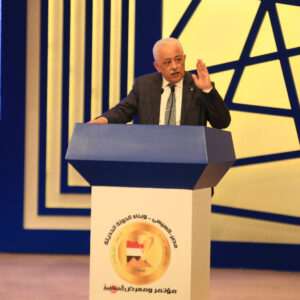
Educational revolution
For his part, Minister of Education Tarek Shawki said in his speech that the achievements made in Egypt in recent years and the building of the modern state constitute a revolution by all standards.
He added that education in Egypt is a huge system. He noted that the number of students in 2017 was 21 million, and now we have 24 million students. He pointed out that the Egyptian education system now focuses on providing students with skills necessary for the labour market.
He explained that the year 2014 witnessed the implementation of the vision of the modern state to develop the education system, pointing out that the Ministry of Education, since 2018, has started a comprehensive process to change the curricula system. He added that the new academic year will witness the addition of two TV channels directed to parents and teachers.
The minister said that in the coming period, there will be optional curricula for students that cover all the required skills. He noted that the students have proven their ability to deal with modern technology, as the number of views of the education platforms affiliated with the ministry, reached 55 million views
On a positive note, the minister said that two million tablets were distributed to students. So far, there are 24 applied technology schools and 44 Egyptian Japanese schools. The minister also stressed the paramount importance of joining efforts to combat the phenomenon of cheating in exams.
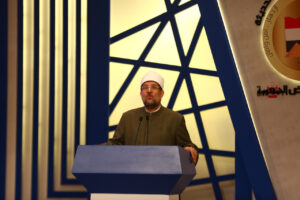
Keeping fanaticism at bay
Minister of Waqs Muhammad Mokhtar Gomaa reviewed his ministry’s achievement during the era of President Abdel Fattah El Sisi in tandem with the state’s philosophy in building a new state.
In his speech at the conference, Minister Gomaa stressed that the ministry has made great achievements during the era of President Sisi, including protecting Egyptian mosques from fanatical thinking. He added that the ministry stepped up efforts to renew religious discourse, spread moderate religious thought that builds and does not destroy, believes in diversity, pluralism and acceptance of the other, and works to consolidate the foundations of equal citizenship, and peaceful coexistence among the people of the same nation.
The ministry also focused on confronting extremist ideology, and refuting their misconceptions. He added that the ministry has been working to fill the gap between religion, science and culture through fruitful co-operation with scientific, educational and cultural institutions along with the ministries of culture, education, and higher education through co-operation protocols.
The minister noted that LE6.6 billion were allocated for the development and construction of 6,500 mosques.
Over the past seven years, the state continued to work on building, maintaining, developing and renovating places of worship. The state, he continued, was able to achieve a breakthrough in mosque architecture through replacement, renewal and maintenance.
The ministry also worked to improve social conditions of preachers by increasing their salaries. The minister referred to the opening of the International Endowment Academy to train imams and preachers, prepare trainers and to play a leading role in the field of training. It has implemented (498) training programmes for imams, preachers, administrators, and endowment-affiliated entities. He also referred to the launch of the awareness-building strategy 2021 in co-operation with the Supreme Council for Media.
During the period 2014-2021, the ministry organised nine international conferences. Meanwhile, it co-operates with the Ministry of Social Solidarity in various initiatives as part of its social responsibility, the minister added.
South Sinai projects
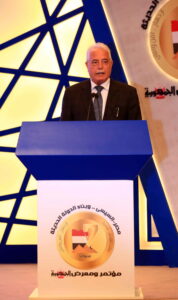
South Sinai Governor Khaled Fouda said that up to 285 pre-university education projects were completed at a cost of LE386 million in addition to five projects for Al-Azhar education costing LE40.6 million.
Nine housing and public utilities projects worth LE1.9 billion were carried out in South Sinai. The government has embarked on slum clearance in South Sinai at a cost of LE288.5 million and 122 projects for drinking water and waste water. Up to 25 electricity schemes were completed at a cost of LE492 million.
Security efforts succeeded in maintaining stability, which is conducive to the implementation of various infrastructure projects.
Sinai possesses many elements that attract investment and has always been in need of infrastructure projects to benefit from and invest in its natural wealth. This region with its unique geographical location has many areas for potential investment, such as agriculture, mining and fisheries.
Sharm Middle Road
Linking South Sinai and Sharm El-Sheikh, the middle road was opened in December 2015. The 12-kilometre road was designed according to the latest international standards costing LE120 million.
New Sharm Road
This six-lane highway passes through Ras Sedr, Abu Zenimah, Abu Rudeis and el-Tur to Sharm el-Sheikh – a total distance of 342 kilometres. There are 14 filling stations on both sides of the road at 50 kilometre intervals. The project cost a total LE3.5 billion.
Wadi Siaal-Saint Catherine
The first stage of this road was completed in October 2019, which included paving, developing and raising the efficiency of the 75-kilometre road at a cost of LE300 million.
30 June Axis
Around 150,000 workers constructed the 30 June Axis Road from February 2015 to November 2019 at the cost of LE5 billion. The road is one of the projects planned by the Egyptian Housing Ministry’s Sinai Urbanisation Authority. The 95-kilometre road is 95k long is crossed by 17 bridges and underpassed by 18 tunnels.
Galala Road
This 5-kilometre road on elevations ranging from 90 metres to 210 meters above
sea level offers the most convenient route to Hurghada. The road was
also built for the sake of development on Ain Sokhna and the new Galala City at an estimated cost of LE4.5 billion.
Ain Sokhna-Zaafarana
This six-lane highway road extends from south Port Said to the Ismailia Desert Road 92 kilometres to the south, linking the Beni Sueif-Zaafarana Road. The road also connects with the 30 June Axis Road to facilitate trade movement between Egypt and the rest of Africa.
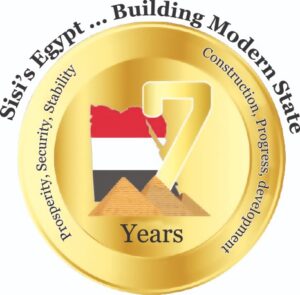



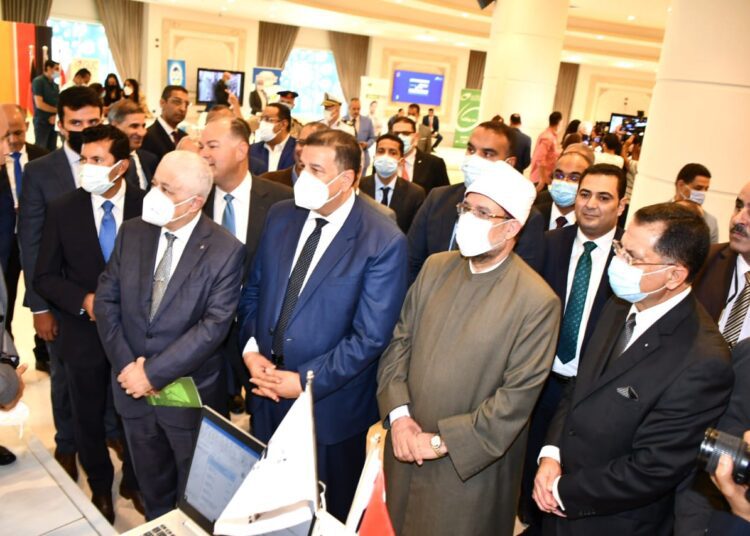


Discussion about this post